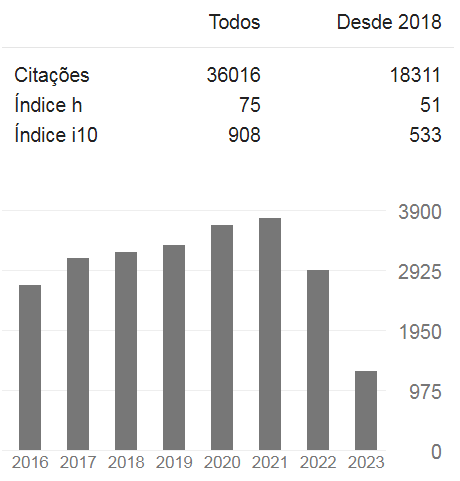Organizational culture in nursing work
influences in adherence to quality and safety practices
DOI:
https://doi.org/10.5935/1415-2762.20200067Keywords:
Organizational Culture, Quality Management, Hospitals, University, NursingAbstract
Objective: to analyze the influence of organizational culture on the Nursing team's adherence to the model of quality management and patient safety in a university hospital. Method: a single case study, with a qualitative approach,
using the theoretical framework of Fleury and Fischer, in the internal medicine units. Eleven nurses and 11 Nursing technicians participated. The data was collected through observation, documentary consultation and interviews, being subjected to thematic content analysis. Results: the symbolic elements of the organizational culture were identified: the power of the teacher and the power of
the doctor, strength of the university culture, stability of statutory professionals, myth of the seventh floor of the medical ward, public service work process, work overload and insufficient number of staff. These elements guide actions and determine behaviors in the face of institutional routines, rules and proposals. Conclusion: Nursing experiences conflicts, leadership difficulties and inefficiency
of regulatory mechanisms, creating an environment in which authorities, roles and responsibilities are not recognized. It maintains in its practices the symbolic
elements of culture and mechanisms of resistance in a structure in which the power of the teacher and the doctor determines decisions of the units.
References
Caldana G, Gabriel CS. Evaluation of the hospital accreditation program: face and content validation. Rev Bras Enferm. 2017[citado em 2020 mar. 13];70(1):47-53. Disponível em: https://doi.org/10.1590/0034-7167-2016-0184
Aristova N. Rethinking cultural identities in the context of globalization: linguistic landscape of Kazan, Russia, as an emerging global city. Procedia Soc Behav Sci. 2016[citado em 2019 dez. 13];236:153-60. Disponível em: https://doi.org/10.1016/j.sbspro.2016.12.056
Fleury MTL, Fischer RM. Cultura e poder nas organizações. 2ª ed. São Paulo: Atlas; 2013.
Oliveira JLC, Matsuda LM. Benefits and difficulties in the implementation of hospital accreditation: the voice of quality managers. Esc Anna Nery Rev Enferm. 2016[citado em 2020 mar. 13];20(1):63-9. Disponível em: https://doi.org/10.5935/1414 8145.20160009
Freire EMR, Guimarães MFL, Ventura PFEV, Alves M. Vivências de enfermeiros no processo de avaliação da qualidade em um Hospital Universitário. Nursing. 2016[citado em 2019 dez. 12];17(219):1154-60. Disponível em: https://www.researchgate.net/publication/308677561_Vivencias_de_enfermeiros_no_processo_de_avaliacao_da_qualidade_em_um_hospital_universitario
Minayo MCS. Amostragem e saturação em pesquisa qualitativa: consensos e controvérsias. Rev Pesq Qualitativa. 2017[citado em 2020 fev. 8];5(7):1-2. Disponível em: http://rpq.revista.sepq.org.br/index.php/rpq/article/view/82
Hospital das Clínicas da Universidade Federal Minas Gerais. 90 anos de cuidado e celebração da vida: catálogo comemorativo. Belo Horizonte: Universidade Federal de Minas Gerais; 2018[citado em 2020 jan. 18]. Disponível em: http://www2.ebserh.gov.br/documents/218065/404274/Catalogo_Hospital+das+C%C3%ADnicas_final_%28nova+corre%C3%A7%C3%A3o%292baixa.pdf/0b076042-3d2d-437e-b5d4-822fa90b981b
Hospital das Clínicas da Universidade Federal Minas Gerais. Política de Gestão de Pessoas. Belo Horizonte: HC-UFMG; 2016.
Hospital das Clínicas da Universidade Federal Minas Gerais. Plano de Gestão de Pessoas. Belo Horizonte: HC-UFMG; 2016.
Hospital das Clínicas da Universidade Federal Minas Gerais. Proposta de dimensionamento de leitos por grau de complexidade: 7º andar Clínica Médica, Unidade, Pós UCO/Cardiologia, Unidade de Precaução Respiratória. Belo Horizonte: HC-UFMG; 2018.
Hospital das Clínicas da Universidade Federal Minas Gerais. Pesquisa de avaliação da cultura de segurança do Paciente - Hospital Survey on Patient Safety Culture (HSOPSC). Belo Horizonte: HC-UFMG; 2016.
Hospital das Clínicas da Universidade Federal Minas Gerais. Pesquisa de avaliação da cultura de segurança do Paciente - Hospital Survey on Patient Safety Culture (HSOPSC). Belo Horizonte: HC-UFMG; 2017.
Bardin L. Análise de Conteúdo. 4ª ed. Lisboa: Edições 70; 2016.
Motta RPS. Universities and culture under the Brazilian military dictatorship. Estud ISHiR. 2018[citado em 2020 fev. 05];8(20):92-106. Disponível em: https://ojs.rosarioconicet.gov.ar/index.php/revistaISHIR/article/view/825
Santos JLG, De Pin SB, Guanilo MEE, Balsanelli AP, Erdmann AL, Ross R. Liderança em Enfermagem e qualidade do cuidado em ambiente hospitalar: pesquisa de métodos mistos. Rev Rene. 2018[citado em 2019 nov. 13];19(e3289):1-9. Disponível em: https://doi.org/10.15253/2175-6783.2018193289
Daneliu JL, Santos DVD, Stefanello S, Oliveira VG, Albuquerque GSC. A percepção dos trabalhadores sobre o processo de trabalho em um Hospital Universitário Federal sob gestão de uma empresa estatal de direito privado. Saúde Debate. 2019[citado em 2020 fev. 8]; 43(121):378-89. Disponível em: http://dx.doi.org/10.1590/0103-1104201912107
Druck G. A terceirização na saúde pública:formas diversas de precarização do trabalho. Trab Educ Saúde. 2016[citado em 2020 fev. 8];14(Suppl.1):15-43.Disponível em: http://www.scielo.br/scielo.php?script=sci_arttext&pid=S1981-77462016000400015&lng=en&nrm=iso
Kodama Y, Fukahori H, Sato K, Nishida T. Is nurse managers' leadership style related to Japanese staff nurses' affective commitment to their hospital? J Nurs Manag. 2016[citado em 2020 jan. 13];24(7):884-92. Disponível em: https://doi.org/10.1111/jonm.12392
Rios DRS, Sousa DAB, Caputo MC. Diálogos interprofissionais e interdisciplinares na prática extensionista: o caminho para a inserção do conceito ampliado de saúde na formação acadêmica. Interface (Botucatu). 2019[citado em 2020 mar.10];23:e180080. Disponível em: http://www.scielo.br/scielo.php?script=sci_arttext&pid=S1414-32832019000100263&lng=en
Araujo MT, Velloso ISC, Alves M. Everyday practices of professional in the mobile emergency service. REME - Rev Min Enferm. 2017[citado em 2020 fev. 05];21:e1042. Disponível em: http://reme.org.br/artigo/detalhes/1180
Alves WSB, Nunes MGS, Gouveia VA, Silva JJT. Análise do nível de informação da equipe de Enfermagem sobre eventos adversos. Rev Epidemiol Controle Infec. 2018[citado em 2019 out. 20];8(2):287-94. Disponível em: http://dx.doi.org/10.17058/reci.v8i2.11489
Siqueira CL, Silva CC, Teles JKN, Feldman LB. Management: perception of nurses of two hospitals in the south of the State of Minas Gerais, Brazil. REME - Rev Min Enferm. 2015[citado em 2019 nov. 2];19(4):919-26. Disponível em: http://www.dx.doi.org/10.5935/1415-2762.20150071
Downloads
Published
Issue
Section
License
Copyright (c) 2020 Reme: Revista Mineira de Enfermagem

This work is licensed under a Creative Commons Attribution 4.0 International License.






































